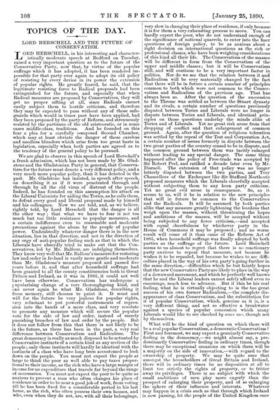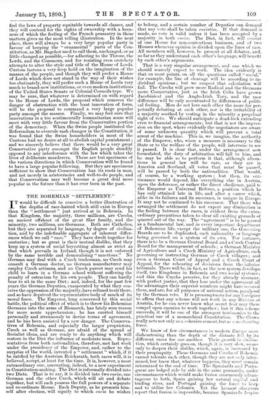TOPICS OF THE DAY.
LORD HERSCHELL AND THE FUTURE OF CONSERVATISM.
TORD HERSCHELL, in his interesting and character- istically moderate speech at Bedford on Tuesday, raised a very important question as to the future of the Conservative Party, now that, by virtue of the popular suffrage which it has adopted, it has been rendered im- possible for that party ever again to adopt its old policy of resisting by every device in its power the extension of popular rights. He greatly feared, he said, that the legitimate resisting force to Radical proposals had been extinguished for the future, and especially that when Radical measures are proposed by Conservatives, they will get no proper sifting at all, since Radicals cannot easily subject them to hostile criticism, and therefore they may be expected to pass without any of those safe- guards which would in times past have been applied, had they been proposed by the party of Reform, and strenuously resisted by the partisans of the old aristocratic, or in some cases middle-class, traditions. And he founded on this fear a plea for a carefully composed Second Chamber, which may at least obviate the danger of those careless and needless blunders which arise from too great haste in legislation, especially when both parties are agreed as to the tendency of the general policy to be pursued.
We are glad to observe in this speech of Lord Herschell's a frank admission, which has not been made by Mr. Glad- stone and the Gladstonian Party in general, that Conserva- tism for the future must denote a very different policy, and a very much more popular policy, than it has denoted in the past. Mr. Gladstone has insisted, in speech after speech, on describing it as if it were penetrated through and through by all the old virus of distrust of the people. Indeed, he has founded on this assumption his attack on the Liberal Unionists for aiding the Tories, as he calls them, to defeat every good and liberal proposal made by himself and his colleagues. Now we are told, and, as we believe, rightly told, by Lord. Herschell that the danger is all the other way ; that what we have to fear is not too much but too little resistance to popular measures, and a certain indifference even to reasonable and moderate precautions against the abuse by the people of popular power. Undoubtedly whatever danger there is in the new situation, lies in that direction, and not in the direction of any orgy of anti-popular feeling such as that in which the Liberals have absurdly tried to make out that the Con- servatives, led by Mr. Balfour, are indulging themselves. They know very well that Mr. Balfour's measure for restoring law and order in Ireland is vastly more gentle and moderate than Mr. Gladstone's measure proposed and passed five years before it, and. that after household. suffrage had been granted to all the county constituencies both in Great Britain and. Ireland, as it was in 1885, it could not well have been otherwise. Conservatism has undergone a ropularising change of a very thoroughgoing kind, and can never again be what Mr. Gladstone, describing it from memory, still chooses to paint it. It must and. will for the future be very jealous for popular rights, very reluctant to put powerful instruments of repres- sion into the hands of a mere class, and very resolute to promote any measure which will secure the popular vote for the side of law and order, instead of merely punishing breaches of law and order by the people. But it does not follow from this that there is not likely to be in the future, as there has been in the past, a very real difference between Conservatism and Radicalism. The great democracy is really as much disposed to be actuated by Conservative instincts of a certain kind as any section of the people ; only those instincts will hardly be identical with the instincts of a class who have long been accustomed to look down on the people. You must not expect the people at large to think the poor as well able to pay taxes propor- tional to their income, as the rich who have a large margin of income for an expenditure that travels far beyond the range of necessaries. You must not expect the poor to be quite as anxious to prevent a man who often changes his place of residence m order to be near a good job of work, from voting tall he has been fixed for a considerable period in his last home, as the rich, who often possess their own houses, and who, even when they do not, are, with all their belongings, , very slow in changing their place of residence, if only because it is for them a very exhausting process to move. You can hardly expect the poor, who do not understand enough of the significance of national quarrels, to enter into the finer questions of foreign policy, to be as anxious about a, right decision on international questions as the rich or professional classes, who have been weighing considerations of this kind all their life. The Conservatism of the masses will be different in form from the Conservatism of the upper and middle classes ; but it will be Conservatism still, and will continue to be a very important factor in politics. Nor do we see that the relation between it and Radicalism will be very materially changed by the fact that there will be in future a certain number of principles common to both which were not common to the Conser- vatism and Radicalism of the previous age. That has always been so. After the question of the succession to the Throne was settled. as between the Stuart dynasty and its rivals, a certain number of questions previously disputed between Tories and Liberals were no longer in dispute between Tories and Liberals, and identical prin- ciples on those questions underlay the minds alike of Tories and of Liberals. Yet no great risk arose from that dropping of conflict and that enlargement of common ground. Again, after the question of religious toleration was settled by the repeal of the Test and. Corporation Act, a certain number of issues formerly in dispute between the two great parties of the country ceased to be in dispute, and the common ground. between them was tacitly enlarged. without leading to any special danger. The same thing happened after the policy of Free-trade was accepted by Sir Robert Peel, and ratified a decade later even by Mr_ Disraeli. The extension of that policy was no longer bitterly disputed between the two parties, and Tory- Chancellors of the Exchequer like Sir Stafford Northcote proposed measures which the Liberals cheerfully accepted. without subjecting them to any keen party criticism. Yet no great evil arose in consequence. So, as it seems to us, will it be in relation to the new principles that will in future be common to the Conservatives and the Radicals. It will be assumed. by both parties alike that any measure greatly lightening the burdens that weigh upon the masses, without threatening the hopes and ambitions of the masses, will be accepted without being subjected to any fierce criticism,—and accepted with equal cheerfulness by whichever party in the House of Commons it may be proposed ; and no worse result will come of it than came of the Reform Act of 1885, when household suffrage was finally adopted by both parties as the suffrage of the future. Lord Herschell seems to us almost to regret that there is no reactionary party anxious to repeal that measure, not because he wishes it to be repealed, but because he wishes to see diffi- culties placed in the way of his own party's going further in the same direction,—difficulties which he but faintly hopes that the new Conservative Party are likely to place in the way of a downward. movement, and. which he perfectly well knows that he and the Liberal leaders cannot safely afford even to encourage, much less to advance. But if this be his real feeling, what he is virtually objecting to is the too great success of his own former Radicalism,—the complete dis- appearance of class Conservatism, and the substitution for it of popular Conservatism, which, genuine as it is, is a very different thing, and not so effective a breakwater against a species of popular concession which many Liberals would like to see checked by some one, though not by themselves.
What will be the kind. of question on which there will be a real popular Conservatism, a democratic Conservatism? First and foremost, we may expect a genuinely Conservative feeling in the democracy,—we might almost say, a pre- dominantly Conservative feeling in ordinary times, though there may be exceptional occasions on which there will be a majority on the side of innovation,—with regard to the ownership of property. We may be quite sure that amongst the householders of Great Britain and Ireland, there will in ordinary times be no disposition at all to limit too strictly the rights of property, or to fritter away its privileges. There is no subject with which the small ambitions of men play more eagerly than the prospect of enlarging their property, and. of so enlarging the sphere of their influence and. interests. Whatever may happen in a crisis such as that through which Ireland is now passing, let the people of the United Kingdom once feel the laws of property equitable towards all classes, and. they will contend for the rights of ownership with a keen- ness of which the feeling of the French peasantry in these matters gives us the most telling illustration. In the next place, there will always be a very large popular party in favour of keeping the " ornamental " parts of the Con- stitution, as Mr. Bagehot used to call them, unchanged, or as little changed as possible,—for adhering to the Throne, the Lords, and the Commons, and for resisting even crotchety attempts to alter the style and title of the House of Lords. Custom fastens a very deep hold on the imagination of the masses of the people, and. though they will prefer a House of Lords which does not stand in the way of their wishes too obstinately, they will prefer such a House of Lords very much to brand-new institutions, or even modern institutions of the United States Senate or Colonial Councils type. We may be sure, that whatever is determined. on with regard to the House of Lords, the proposal which removes the danger of obstruction with the least innovation of form, will be the proposal to command a very large popular party amongst the masses. Finally, we may feel sure that innovations in a too sentimentally humanitarian sense will meet with very little favour from the Conservative portion of the democracy. When the Swiss people instituted the Referendum to overrule rash changes in the Constitution, it was found that the Swiss householders in most of the Cantons had no desire at all to abolish capital punishment ; and we sincerely believe that there would be a very great Conservative party amongst the English people steadily opposed. to any interference with the law which takes the lives of deliberate murderers. These are but specimens of the various directions in which Conservatism will be found to have a large popular following. But they are specimens sufficient to show that Conservatism has its roots in man, and not merely in aristocracies and well-to-do people, and that Conservatism may well become a great deal more popular in the future than it has ever been in the past.



















































 Previous page
Previous page